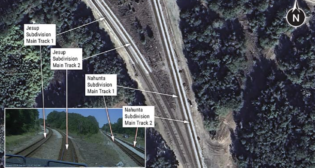
Bombardier, Siemens considering merger options
Written by William C. Vantuono, Editor-in-ChiefUnnamed sources inside Bombardier and Siemens AG have told the Montreal Gazette that the two companies are considering various joint ventures as part of the planned merger of their respective railway divisions.
“The companies are making progress on one joint venture for their rolling stock operations, which would be controlled by Montreal-based Bombardier, and another for signaling [and train control], in which [Munich-based] Siemens would have a majority, said the [sources], who asked not to be identified because the talks are private,” The newspaper reported on June 29. “A deal could be reached in the coming months; no final decisions have been made, and any combination would require political backing, clearance from antitrust authorities and face potential opposition from unions, they said.”
Siemens and Bombardier representatives declined to comment.
AlphaValue analyst Lionel Pellicer told the Gazette that joint ventures would “benefit Siemens, if they do obtain signaling activities, where margins are higher, competition isn’t as fierce and working capital not as heavy.”
Railway division merger negotiations are occurring as Siemens and Bombardier, as well as France’s Alstom, are dealing with increasing competition from China’s CRRC Corp., formed in 2015 from a combination of the country’s two main regional rolling stock manufacturers, CNR and CSR. In the U.S., CRRC, within the space of one year, has won major contracts with the transit systems in Boston (MBTA), Philadelphia (SEPTA), Los Angeles (LACMTA) and Chicago (CTA). CRRC is also the principal financial backer of Vertex Railcar Corp., which recently received its first orders for freight cars.
Siemens Mobility and Bombardier Transportation “have significant overlap in Europe, especially Germany, raising the likelihood of asset sales to allay regulatory concerns, and possible job cuts,” the Gazette reported.
Noted Pellicer, “If Siemens and Bombardier do get a deal, it could affect Alstom’s share price for some time,” adding that a merger may not be all bad news for Alstom because it has been able to win contracts despite competition from CRRC. “Alstom doesn’t necessarily need to get bigger,” he told the Gazette. “It reached a critical size and is focusing on maintenance and services,” he said, adding that CRRC “doesn’t necessarily have a cost advantage since many countries require local production.”
Bombardier Transportation will eliminate as many as 2,200 jobs in Germany by 2020 under a previously announced plan to cut 7,500 positions worldwide, spokesman Marc-Andre Lefebvre told the Gazette. In a statement, the company said it plans to keep all its German manufacturing facilities in operation and invest about $80 million in modernization. Bombardier Transportation and Siemens Mobility both have rail facilities in Berlin; this could generate increased scrutiny of a merger from politicians and unions.
Siemens Mobility and Bombardier Transportation posted C$8.8 billion and C$8.6 billion in sales, respectively, in fiscal year 2016. The former derives the majority of revenue from signaling and train control; the latter from rolling stock. Bloomberg News, followed by the Toronto Globe & Mail, broke the news of merger talks in April, and while both companies dismissed the report as rumors, executives from both said at the time that some sort of consolidation may be needed. “It’s obvious there’s a lot of consolidation going on,” Siemens Chief Financial Officer Ralf Thomas said.
Alstom CEO Henri Poupart-Lafarge said “a certain consolidation” is “probably necessary in Europe” while Bombardier CEO Alain Bellemare said his company was “going to look at the entire industry and industry consolidation, and take a proactive approach.”
Last year, Bombardier sold a 30% stake in its Berlin-based rail division to pension fund asset manager Caisse de Depot et Placement du Quebec, valuing the business at C$5 billion.



